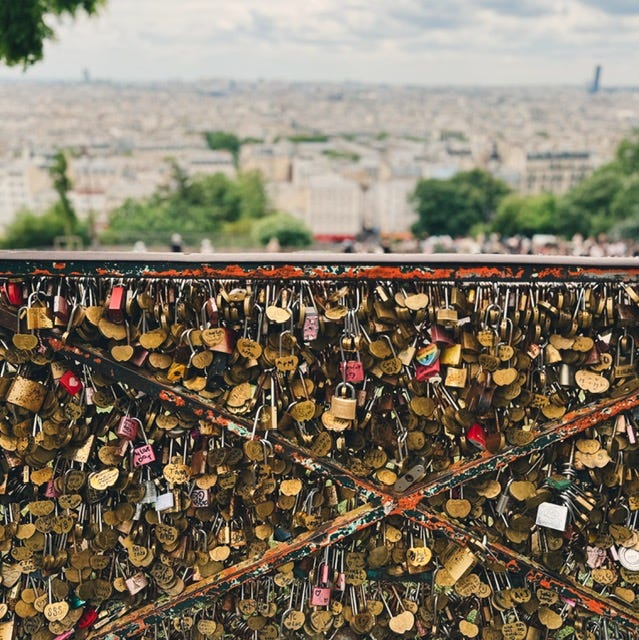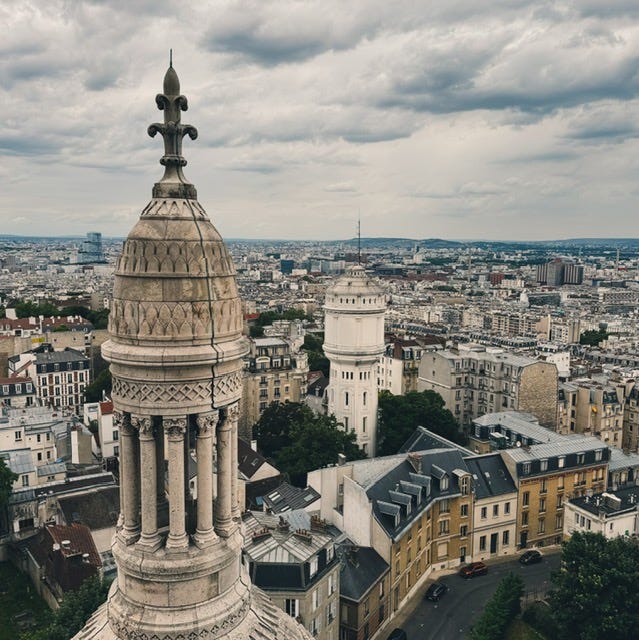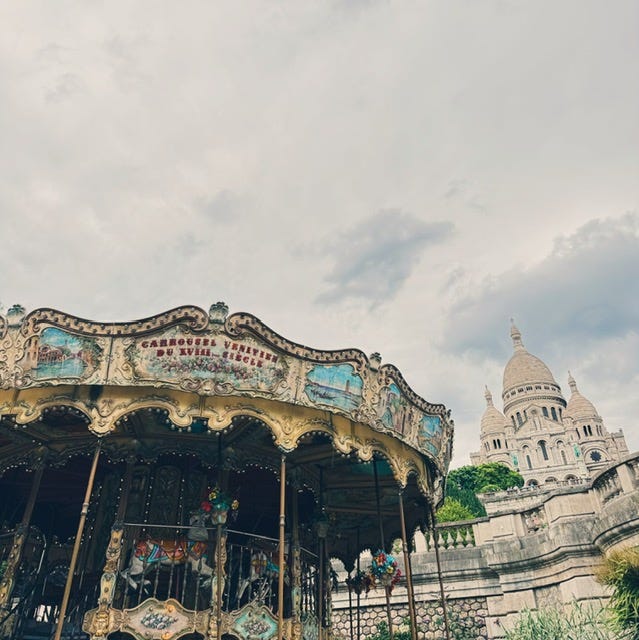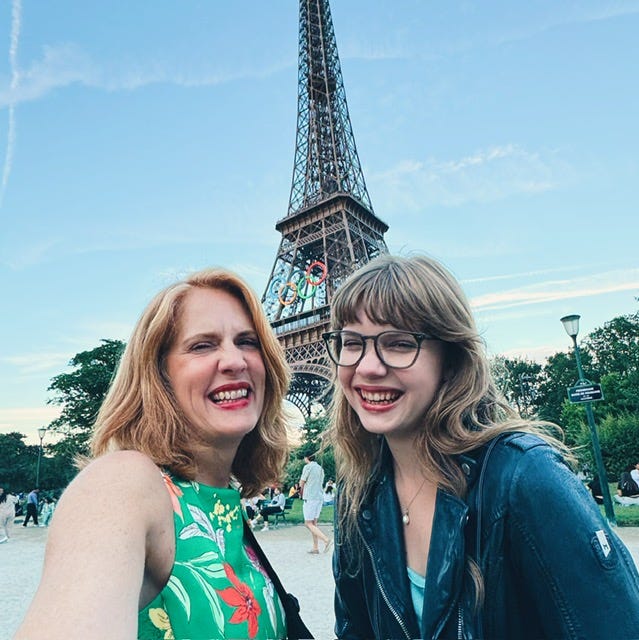Evangelicalism feels like a big, old Victorian house I used to live in. I drive by and have both warm and painful memories when I look up at the structure. Because it’s so familiar, I think about it a lot, and I write about it a lot. I no longer attend that kind of church, but I can quickly place myself back in the house, viewing the world out those unique windows when the Christians have something to say. For about 40 years, I not only attended evangelical churches, but I worked behind the scenes at more than one. I guess it’s obvious that everything I did, believed, voted for, and talked about was deeply influenced, if not directly dictated by, that environment. This week, after the Paris 2024 Olympic Opening Ceremonies, some Christians had things to say. So I perked up to listen, curious if I aligned with my former community or had different thoughts now about whatever was causing the latest disruption.
I watched as the Christian outrage began to crack online, hemorrhaging like an oil tanker in the ocean, and I felt surprised; I had viewed the entire Opening Ceremonies myself and did not anticipate the controversy. Over the next day, I climbed the steps up to that big, buzzing proverbial house again, opened the front door, ducked inside to see what was going on, and I had a realization. I dropped into some threads, I heard the shouts and arguing, and I kept thinking, “No one else knows how afraid everyone is in here.” It all felt so familiar. I recognized the way the fear, on constant drip, kept us vigilant and reactive. It’s not the same outside. I live somewhere else now, and I’ll be the first to tell you: the world can feel scary, but it’s not the same.
What I’m saying is it’s not entirely their fault. As a Christian in the modern evangelical church, you are required to bear layer upon layer of threat in your everyday life, staying attuned to them all without ceasing. It’s your job to defend the interpretation of the Bible that your pastor has told you is correct. You are the police (presumably elected by the divine) at all times, on social media, at the dinner table, and in your community. Yesterday, I saw one thread regarding the confusion some Christians had in thinking the opening ceremonies were depicting a blasphemous version of The Last Supper, where a woman vehemently stated, “We need to be defending the Bible out of obedience.” It was the word need that struck me. The immense pressure of obedience, ever undefinable, can’t be overstated. There is a constant messaging: if you don’t do these things, where “these” is a list of rules both explicit and implied, God is not pleased/God is angry/God is disappointed/God will condemn you in the afterlife.
Take a moment to imagine having these messages running in the background of everything you do and say, every minute of every day. The moral outrage and public reactivity isn’t going away because no one’s lessening the pressure inside the closed system. And it’s very hard to exist within this system while carrying a lighter ethic, a more balanced, peaceful, and accepting administration of Christian beliefs when you are continually being told you’re unsafe. Our primal bodies are designed to detect threat. What do we think happens in our bodies when we are told there are monsters around every corner? To be fair, not every evangelical church focuses on the same core messages, nor do they dispense fear in equal amounts. However, nearly everyone I know who was raised in the larger evangelical system and is now practicing faith differently has had to reconcile damage from the same internalized messages. In other words, across the board, different pastors may have been preaching in different ways, but by and large, we all heard the same things.
The list is long, but some heavy hitters in the traumatizing theology department are these two. First, it’s your job to convert people so they don’t go to hell, a practice referred to as “saving” the lost. That alone is a soul-crushing weight of responsibility. Throw in some denominational differences where in some churches, followers are taught that some people are pre-selected for saving and some are literally destined for hell, and you reach another level of psychological harm. Second, it’s your job to protect not only your children, but the entire next generation from anything deemed demonic. Yet drilling down to where exactly the danger lies is a hopeless task, as the monster shape-shifts constantly, from pop stars to books to tennis shoes to maybe even gay people. It sounds out of hand because it is. These are impossible games to win (though win feels like the wrong word), and the fear of failing at them keeps some Christians at a hair-trigger level of reactivity, which makes complete sense when you think of what fear does to our nervous systems.
I’ve spent the last five years trying to heal mine, after suffering mental and emotional damage, as well as physical sickness from a debilitating degree of hypervigilance cultivated by my evangelical church as well as by being in an emotionally abusive marriage. There are some strong similarities, when you place them side by side, and the two environments fed each other, strengthening their control on my life. Before I was fully out of both my church and my marriage, I told my therapist that I didn’t have any tools to deal with the persistent fear in my life. He paused, and said very slowly, “You never needed tools. You needed comfort.”
A person in an abusive marriage feels as though their spouse is the sun around which everyone else must revolve. The spouse, often a narcissist, thrives here, assuming they belong at the center of attention and always needing sources who keep them there. The dynamic is so strong it’s not exaggeration to call it a gravity, created by the narcissist, to keep everyone moving in his or her prescribed orbits. One of the responses I saw over and over regarding the outrage at the Opening Ceremonies was that other cultures do not necessarily revolve around a Christian worldview. The assumption that some evangelicals make is that Christianity is the sun, the thing keeping us all alive at the center, with a gravitational pull so strong that the rest of the world should fall into its orbit. In reality, we aren’t at the center, and yet we seem to be the last to find this out. Online, people from all over were trying to remind the outraged that the Olympics aren’t an American Christian event, and so aren’t in any way subject to their rules. If the level of outrage weren’t so alarming, it would be a bit funny. I was deep in a similarly reactive religious community for decades, and I was still surprised by the intensity of backlash this week; for a religion with love supposedly at is core, being offended that you’re not the sun other cultures revolve around is shocking and unsettling to the rest of us.
I know it’s not conscious; it wasn’t in my marriage either. The positions and pathways of all players in the universe of our home were carved over time until they were the only reality we knew. In the church, it was the same. And so this week, in search of context and compassion, it took me a minute to remember how afraid we all were. Fear, dripped evenly over years into the veins of life we held most sacred — your family is under threat, your kids are under threat, your livelihood is under threat, your afterlife is under threat — distorted our view of reality, left us jumpy, kept us panicked, until panic-in-community became a familiar and popular way to try to self-soothe. I was so good at panic, so incredibly jumpy in my daily life that it looked like productivity. In fact, my closest friends know the hypervigilance haunts me still. After leaving my church and my marriage, five years out, my body can go into a state of panic over the littlest thing. I can get triggered and go into an intense fight or flight response, and I can’t ever think my way out of it. I just have to let it slowly, painfully pass. Fear is disorienting. Fear over time keeps us psychologically shredded.
Before I heard about any outrage, I watched the 2024 Opening Ceremonies with my parents and daughter over a Parisian-inspired lunch. We made Croque Madame sandwiches with the good gruyere, poured mimosas, and ate an entire box of pastries from a local French bakery. I loved the whole show. I did raise an eyebrow, and my daughter and I chuckled during the part where an implied threesome was about to happen behind a closed door. But we were watching a show by the French, one of the most sexually open cultures on earth, and so I was neither surprised nor offended. Nothing to see here.
The rest felt like theater, live performance and storytelling, celebration and joy. I was impressed by their aggressive lean toward diverse representation, like including Paralympians in the torch processional as well as featuring people of all races, genders, ages, abilities, and orientations in the four-hour production. Anyone watching could find themselves in the show. Everyone was invited to the table, which reminds me of God, who leaves no one out, who stamps every body with their divine image. I simply can’t get on board with a God who wants a police-state where followers hold people up to a list of rules. My personal take is that God wants lovers, laughers, and artists calling out the truth. And I think to “fear not” is incredibly hard.
What’s easier is to adopt a lifestyle where you’re prepped to fight or flee at a moment’s notice, especially when everyone around you is doing the same. I observed in the online threads this week the way Christian outrage feels like a way to self-soothe in community, but the obvious problem is that no one is actually being soothed by it. There is no comfort in crying wolf, no safety in the throngs of the dysregulated. It’s another way fear robs us of something rich: we are supposed to find comfort in community, but a collective primarily united by fear keeps us isolated en masse, each of us trembling, exposed and untrusting, desperate for someone to tell us we’re going to be okay. But instead of preaching messages of love, acceptance, and safety, which I find to be the Bible’s lowest hanging fruit, some evangelicals insist on telling the story of a decrepit society, one crumbling and unpredictable, where no one is safe so you must keep your guard up and your weapons ready. I don’t live in that house anymore partly because my nervous system can no longer bear such a scary story.
Even outside of it, I feel scared often, for my family, for my body, my country. At times, I need communal self-soothing, and I believe there are safer ways to find connection than aligning with online panic disguised as religious conviction. Even reading the threads isn’t helpful for my heart. Inside the church, I wasn’t given tools for self-regulating when afraid, probably because no one was present to the extreme nervous system dysregulation we were accommodating. And I certainly wasn’t given any real comfort in light of my fears. I’ve been learning, though, and I have a pack of friends who have had to do this same work. We breathe, we stretch. Sometimes we dance. We can’t seem to stop grieving. And we keep trying to get to know a God who is never surprised, never panicked. We try our hardest to pick up a bit of Her peace and tuck it like a stuffie in the crook of the arm, while we lie next to one another in the dark.
You are the Beloved.
Leslie











You’ve put into words something that was floating just out of reach. The fear is so obvious once named, yet an overarching command in the Bible is ‘Fear Not’. Sobering.
As a liberal Episcopalian and outsider to the evangelical community, I found this piece to be one of the best explanations I have ever read of the reasons for the constant outrage against seemingly invented enemies by evangelicals that I find so inexplicable. I too watched the whole opening ceremonies and thought it was brilliant (and very French). I also chuckled at the ménage a trois and gasped a bit at the Marie Antoinette heads but thought it was a provocative way of acknowledging dark parts of French history in a way we never would. I didn’t even notice the so called Last Supper tableau, provably because I was bored by the fashion show (which apparently was a “drag show”?) that surrounded it. So, I was quite flummoxed by all the outrage.